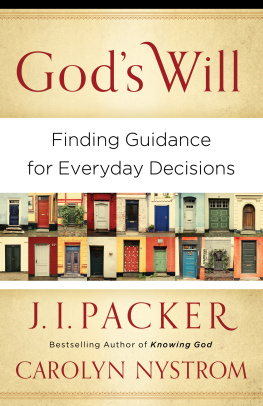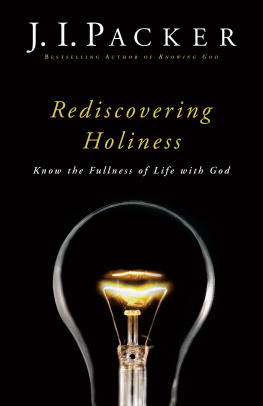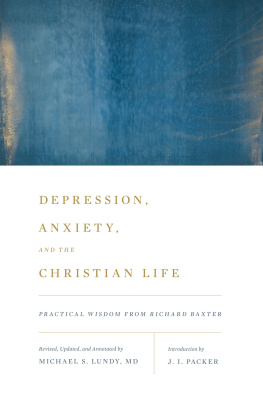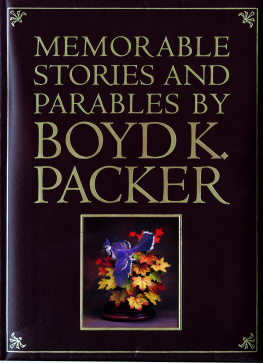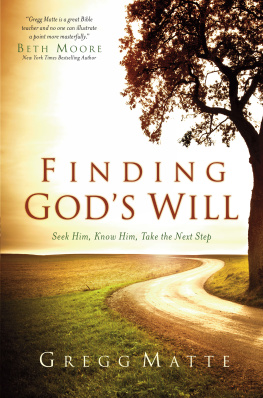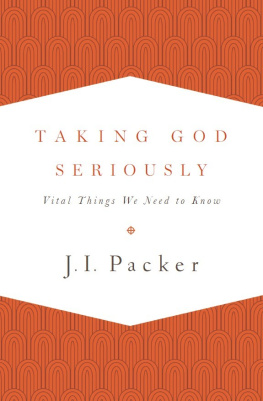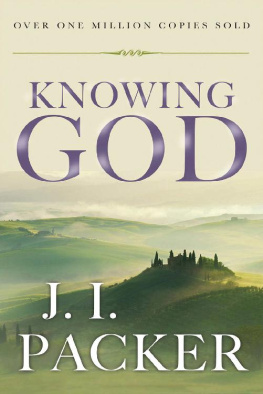J. I. Packer - Gods Will: Finding Guidance for Everyday Decisions
Here you can read online J. I. Packer - Gods Will: Finding Guidance for Everyday Decisions full text of the book (entire story) in english for free. Download pdf and epub, get meaning, cover and reviews about this ebook. year: 2012, publisher: Baker Publishing Group, genre: Religion. Description of the work, (preface) as well as reviews are available. Best literature library LitArk.com created for fans of good reading and offers a wide selection of genres:
Romance novel
Science fiction
Adventure
Detective
Science
History
Home and family
Prose
Art
Politics
Computer
Non-fiction
Religion
Business
Children
Humor
Choose a favorite category and find really read worthwhile books. Enjoy immersion in the world of imagination, feel the emotions of the characters or learn something new for yourself, make an fascinating discovery.
- Book:Gods Will: Finding Guidance for Everyday Decisions
- Author:
- Publisher:Baker Publishing Group
- Genre:
- Year:2012
- Rating:3 / 5
- Favourites:Add to favourites
- Your mark:
- 60
- 1
- 2
- 3
- 4
- 5
Gods Will: Finding Guidance for Everyday Decisions: summary, description and annotation
We offer to read an annotation, description, summary or preface (depends on what the author of the book "Gods Will: Finding Guidance for Everyday Decisions" wrote himself). If you haven't found the necessary information about the book — write in the comments, we will try to find it.
Gods Will: Finding Guidance for Everyday Decisions — read online for free the complete book (whole text) full work
Below is the text of the book, divided by pages. System saving the place of the last page read, allows you to conveniently read the book "Gods Will: Finding Guidance for Everyday Decisions" online for free, without having to search again every time where you left off. Put a bookmark, and you can go to the page where you finished reading at any time.
Font size:
Interval:
Bookmark:

2008 by J. I. Packer and Carolyn Nystrom
Published by Baker Books
a division of Baker Publishing Group
P.O. Box 6287, Grand Rapids, MI 49516-6287
www.bakerbooks.com
Previously published under the title Guard Us, Guide Us
Ebook edition created 2012
Ebook corrections 04.10.2015
All rights reserved. No part of this publication may be reproduced, stored in a retrieval system, or transmitted in any form or by any meansfor example, electronic, photocopy, recordingwithout the prior written permission of the publisher. The only exception is brief quotations in printed reviews.
ISBN 978-1-4412-3592-3
Library of Congress Cataloging-in-Publication Data is on file at the Library of Congress, Washington, DC.
Unless otherwise indicated, Scripture is taken from The Holy Bible, English Standard Version, copyright 2001 by Crossway Bibles, a division of Good News Publishers. Used by permission. All rights reserved.
Scripture marked NLT is taken from the Holy Bible , New Living Translation, copyright 1996. Used by permission of Tyndale House Publishers, Inc., Wheaton, Illinois 60189. All rights reserved.
Scripture marked Phillips is taken from The New Testament in Modern English, revised editionJ. B. Phillips, translator. J. B. Phillips 1958, 1960, 1972. Used by permission of Macmillan Publishing Co., Inc.
Scripture marked RSV is taken from the Revised Standard Version of the Bible, copyright 1952 [2nd edition, 1971] by the Division of Christian Education of the National Council of the Churches of Christ in the United States of America. Used by permission. All rights reserved.
Scripture marked TNIV is taken from the Holy Bible, Todays New International Version. TNIV. Copyright 2001, 2005 by Biblica, Inc. Used by permission of Zondervan. All rights reserved worldwide. www.zondervan.com
Italics in Scripture quotations have been added by the authors for emphasis.
Prologue: The Taste of Fear
1. The Shepherd and His Sheep
2. Some Tangled Tales
3. Your Good Health
4. Guided by the Word of God
5. The Way of Wisdom
6. With a Little Help from Our Friends
7. Modeling
8. Guided Life Commitments
9. Situation Ethics
10. Guarded and Guided by the Holy Spirit
Epilogue: An End to Fear
Appendix: John Newton on Divine Guidance
For Discussion and Reflection
Notes
Lead us, heavenly Father, lead us
Oer the worlds tempestuous sea;
Guard us, guide us, keep us, feed us,
For we have no help but thee;
Yet possessing every blessing
If our God our Father be.
Savior, breathe forgiveness oer us;
All our weakness thou doest know;
Thou didst tread this earth before us,
Thou didst feel its keenest woe;
Lone and dreary, faint and weary,
Through the desert thou didst go.
Spirit of our God, descending,
Fill our hearts with heavenly joy;
Love with every passion blending,
Pleasure that can never cloy;
Thus provided, pardoned, guided,
Nothing can our peace destroy.
James Edmeston (17911867)
The Taste of Fear
Fear of imminent bodily harm has an unpleasant flavor in the most literal sense. Bile rises from the stomach and plants in ones throat a sharp, bitter, metallic taste. So it was with J. I.s American friend as he and the birthday girl drifted out to sea off the coast of Maui on a capsized catamaran with a large shark swimming quietly round and round them. So it was with his Canadian friend as she trod water in the chilly Pacific after the boat had sunk. J. I. has known the taste himself, and probably you have too; you would be a remarkable person if you have not.
Other forms of fear may not leave the same bad taste in the mouth, but metaphorically they can spoil the taste of your life. They cloud your spirit by day, they keep you awake at night, they undermine your concentration at all hours, and they make you run scared on a regular basis. Of all the modes of drivenness that human life embraces, being driven by fear is perhaps in the long run the most uncomfortable and the most damaging; it spoils your relationships by draining your capacity to live, it robs you of wisdom by keeping you looking sideways rather than straight ahead, and it is a very hard disability to overcome.
During the past century and a half, the topic of guidance from God has become a focus of just such fear in many Christian hearts. Christian people have always rejoiced in the certainty that God in his omniscient wisdom and grace is working out his plan for our lives, and that he helps us in our decision making and strengthens us to do what obedience to his revealed will requires of us. But in some quarters the exuberant, outward-looking holiness modeled by such men as John Wesley and William Wilberforce shrank into a legalistic pietism. Pietism, which means living by the belief that nothing in life matters so much as my personal relationship with God, is right and good, but legalism, which means living by the belief that the quality of my relationship with God depends on my turning in some form of correct performance, is neither. In this case, two specific things went wrong. First, the notion spread that getting and following direct guidance from God, as something above and beyond making commonsense decisions in Christian terms, was a matter of great importance in the Christian life. Second, Gods plan for the Christian individuals life came to be thought of like a travel itinerary in which making planned connections is crucial and missing a connection wrecks the plan and spoils the rest of the journey. For now a second-rate plan B must be formed to replace the original ideal, but now impracticable, plan A, and this will certainly involve some measure of loss.
In consequence, fearful (fear-full) and perplexed anxiety with regard to decision making became widespread among evangelical people. Believers felt unable to make far-reaching decisions until they had received some special personal indication from God as to what they should do. Fear of making what from Gods standpoint would be wrong commitments vocationally, professionally, socially, relationally, and matrimonially induced a kind of inner paralysis that resulted in good and desirable commitments not being made, because people could not bring themselves to make any commitment at all (which was, of course, an instance of decision making in itself, though it was not usually seen that way). This has not been a happy state of affairs.
The irony of the situation was that teachers (there once were many of them) who warned against sentencing oneself to the second-rateness of a plan B through not asking Gods guidance diligently enough and so failing to make the right decision, were trying to ensure that Christians would face up to Christs call to embrace costly, self-denying service of others for his sake. At one time it was almost axiomatic among evangelicals that all who aimed to be first-class Christians should become either missionaries overseas or ministers/ministers wives or medical personnel (doctors or nurses) or masters/mistresses in schools. All other walks of life, however legitimate, were viewed as second-class by comparison with these. So young Christians were urged to seek personal guidance into one or other of the favored four, rather than into any more lucrative line of work.
None of this, to be sure, was wholly wrong. These four forms of service do in fact ordinarily offer more opportunities for doing good and bringing immediate benefit to people than do many other trades and professions; so they should be seen as privileged, and young people should be encouraged to aspire to one of them on this account. But the idea that they set you in a higher plane spiritually is a new form of the medieval superstition that God sees the professionally religious as a cut above everyone else. And the idea that you would need a special sign from God, over and above interest, aptitude, and the estimate of your fitness by others, to warrant your committing yourself to serve in one of these fields, or in any other employment for that matter, is superstition too.
Font size:
Interval:
Bookmark:
Similar books «Gods Will: Finding Guidance for Everyday Decisions»
Look at similar books to Gods Will: Finding Guidance for Everyday Decisions. We have selected literature similar in name and meaning in the hope of providing readers with more options to find new, interesting, not yet read works.
Discussion, reviews of the book Gods Will: Finding Guidance for Everyday Decisions and just readers' own opinions. Leave your comments, write what you think about the work, its meaning or the main characters. Specify what exactly you liked and what you didn't like, and why you think so.

